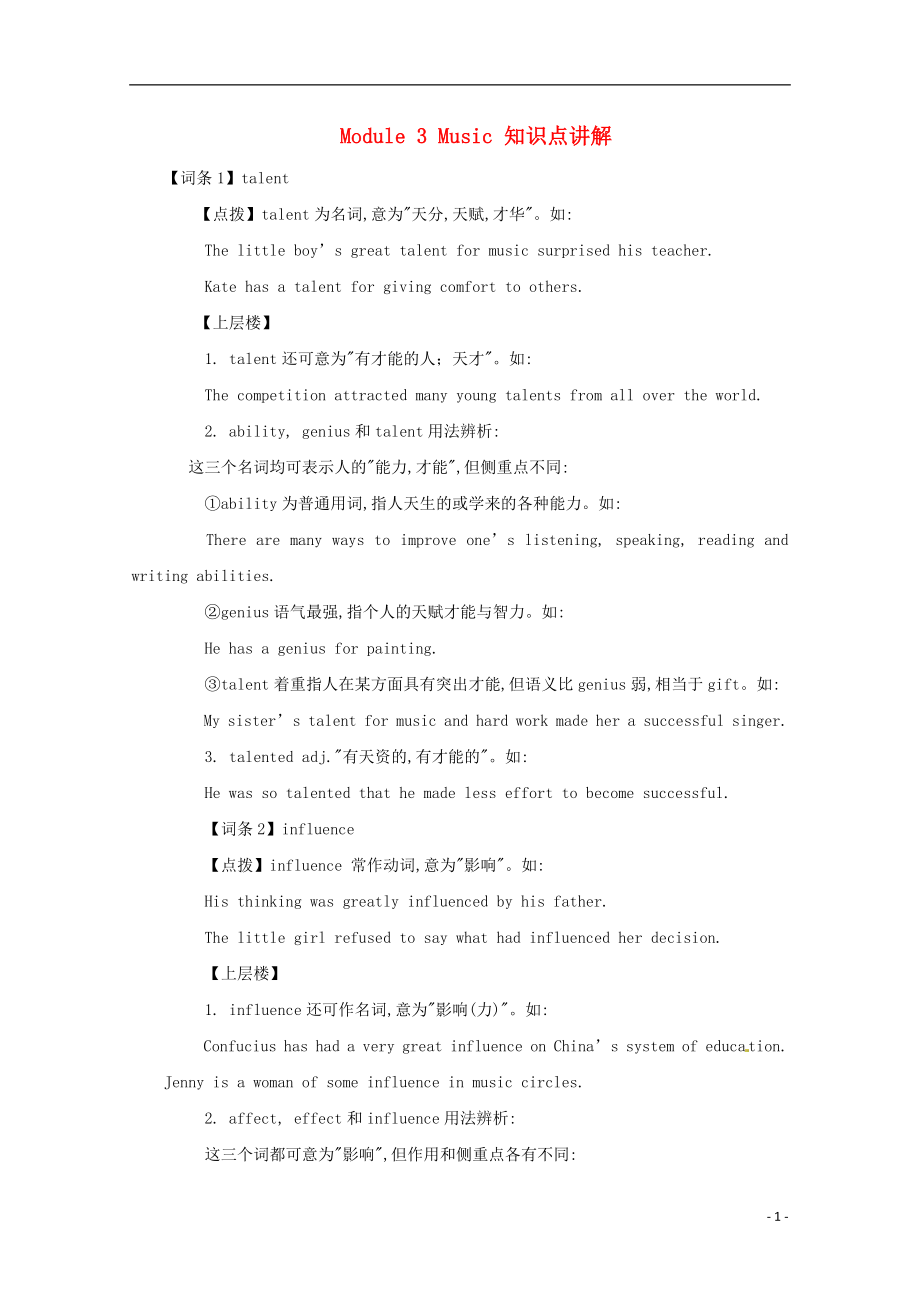《遼寧省沈陽市第二十一中學(xué)高中英語 Module 3 Music 知識(shí)點(diǎn)講解 外研版必修2》由會(huì)員分享�����,可在線閱讀�����,更多相關(guān)《遼寧省沈陽市第二十一中學(xué)高中英語 Module 3 Music 知識(shí)點(diǎn)講解 外研版必修2(5頁珍藏版)》請?jiān)谘b配圖網(wǎng)上搜索。
1�、
Module 3 Music 知識(shí)點(diǎn)講解
【詞條1】talent
????【點(diǎn)撥】talent為名詞,意為"天分,天賦,才華"。如:
???? The little boy’s great talent for music surprised his teacher.
???? Kate has a talent for giving comfort to others.
????【上層樓】
???? 1. talent還可意為"有才能的人��;天才"��。如:
???? The competition attracted many young talents from all ov
2�����、er the world.
???? 2. ability, genius和talent用法辨析:
?? 這三個(gè)名詞均可表示人的"能力,才能",但側(cè)重點(diǎn)不同:
???? ①ability為普通用詞,指人天生的或?qū)W來的各種能力���。如:
???? There are many ways to improve one’s listening, speaking, reading and writing abilities.
???? ②genius語氣最強(qiáng),指個(gè)人的天賦才能與智力。如:
???? He has a genius for painting.
???? ③talent著重
3���、指人在某方面具有突出才能,但語義比genius弱,相當(dāng)于gift����。如:
???? My sister’s talent for music and hard work made her a successful singer.
???? 3. talented adj."有天資的,有才能的"�。如:
???? He was so talented that he made less effort to become successful.
???? 【詞條2】influence
???? 【點(diǎn)撥】influence 常作動(dòng)詞,意為"影響"。如:
???? His thinking w
4���、as greatly influenced by his father.
???? The little girl refused to say what had influenced her decision.
???? 【上層樓】
???? 1. influence還可作名詞,意為"影響(力)"�。如:
???? Confucius has had a very great influence on China’s system of education.
Jenny is a woman of some influence in music circles.
???? 2. a
5、ffect, effect和influence用法辨析:
???? 這三個(gè)詞都可意為"影響",但作用和側(cè)重點(diǎn)各有不同:
???? ①affect為動(dòng)詞,主要指短暫的影響�。如:
???? The result of the experiment has been affected by the bad weather.
???? ②effect多作名詞,have an effect on相當(dāng)于affect。如:
???? Be careful with your words. They will have a great effect on the children.
???? ③i
6�����、nfluence既可作名詞也可作動(dòng)詞,主要指對行為���、性格���、觀點(diǎn)等產(chǎn)生間接的或潛移默化的影響。如:
???? There is no doubt that the Internet has a strong influence on people.
???? 3. influential adj."有很大影響(力)的"���。如:
???? He is a very influential man in the government.
????
????經(jīng)典短語透視
????
????【短語1】mix...with
????【點(diǎn)撥】mix ... with意為"混合",也可合用為m
7�����、ix with�����。如:
???? Jay Chou is famous for mixing Chinese music style with R&B.
???? Oil cannot mix with water.
????【上層樓】
???? 1. mix with還可意為"相處,交往"�����。如:
???? The new student mixed well with her classmates.
???? 2. 與mix有關(guān)的其他常用短語有:
???? ①mix sth. in with sth."和入,把(某物)摻入(另一物)"���。如:
???? Mix some wate
8�、r in with the flour.
???? ②mix sb. / sth. up "混淆(相似的人或物)�;弄亂,弄混"。如:
???? It’s easy to mix Jack’s pen up with Tom’s.
???? Don’t mix up these files, or we won’t be able to find the right one when we need it.
???? 【短語2】be known as
???? 【點(diǎn)撥】be known as意為"被稱為,以……著稱"�。如:
???? Yuan Longping is known as
9、 China’s "Father of Hybrid Rice".
???? Zhang Yimou is known as one of the most famous directors in the world.
???? 【上層樓】
???? 1. be known to"為(某人)所熟知"���。如:
???? Martin Luther King is known to the world as a fighter for freedom.
???? 2. be known for"因……而著名"�����。如:
???? The little village is known for
10�����、 its great natural scenery.
???? 3. make oneself known to"自我介紹給……"。如:
???? The new manager will make himself known to the company in the next meeting.
???? 【短語3】be impressed with
???? 【點(diǎn)撥】be impressed with 相當(dāng)于be impressed by 意為"對……印象深刻���;為……所感動(dòng)"�����。如:
???? —What do you think of the restaurant where
11�、we had supper yesterday?
???? —I was deeply impressed with its excellent service.
???? We are all deeply impressed by the effort that you have made.
???? 【上層樓】
???? 1. impress v."給……留下印象;使銘記"����。常用于以下結(jié)構(gòu):
???? ①impress sth. on / upon sb."使意識(shí)到重要性或嚴(yán)重性等"。如:
???? My parents impressed the value of bein
12��、g sincere(真誠的)on / upon me.
???? ②impress sb. with sth."給……留下刻印象"�����。如:
???? The girl impressed me with her beautiful long hair.
???? 2. impression n."印象"��。如:
???? Her performance left quite a good impression on the audience.
????
????熱點(diǎn)語法聚焦
????
????◆●■when, while和as引導(dǎo)的時(shí)間
???? 狀語從句
???? whe
13�、n, while和as都可以引導(dǎo)時(shí)間狀語從句,意為"當(dāng)……"。當(dāng)從句動(dòng)作和主句動(dòng)作同時(shí)發(fā)生,且從句動(dòng)作為延續(xù)性動(dòng)詞時(shí),when, while和as都可使用���。這里
???? 我們主要講解一下它們的用法區(qū)別:
???? 1. when可以和延續(xù)性動(dòng)詞連用,也可以和短暫性動(dòng)詞連用,而while和as只能和延續(xù)性動(dòng)詞連用����;when從句的謂語動(dòng)作可以在主句謂語動(dòng)作之前���、之后或同時(shí)發(fā)生,而while和as從句的謂語動(dòng)作一般是和主句謂語動(dòng)作同時(shí)發(fā)生�����。如:
???? I was washing clothes when you called me last night. (call為短暫性動(dòng)詞)
??
14���、?? The journalists took notes as they listened to the report.(listen為延續(xù)性動(dòng)詞)
???? When he had found the book he took a deep breath.(found先發(fā)生)
???? When I got to the airport my friend had already left.(got后發(fā)生)
???? 2. 當(dāng)強(qiáng)調(diào)伴隨狀態(tài),意為"隨著……���;一邊……一邊……"時(shí),一般用as。如:
???? As time went by, the two strangers beca
15�����、me familiar with each other.
???? 3. 在將來時(shí)態(tài)的從句中,常用when,從句須用一般現(xiàn)在時(shí)表將來���。如:
???? When I arrive in London next week I will contact you.
???? ◆●■過去完成時(shí)
???? 1. 過去完成時(shí)的構(gòu)成:助動(dòng)詞had + 過去分詞,其否定形式為had + not + 過去分詞�����。
???? 2. 過去完成時(shí)的用法:
???? 1)表示在過去某一時(shí)刻或某一動(dòng)作之前已經(jīng)完成了的動(dòng)作(即"過去的過去")或表示從過去某一時(shí)刻開始一直延續(xù)到另一過去時(shí)刻的動(dòng)作或狀態(tài),常與by,
16�����、for, before, since或由after, before, since, when, by the time等引導(dǎo)的時(shí)間狀語從句連用。如:
???? Jack had left for New York by ten o’clock.
???? By the time I got there, the game had already ended.
???? 2)表示未曾實(shí)現(xiàn)的希望或打算,主要用于plan, hope, want, expect, think, suppose等動(dòng)詞,意為"原打算(希望、想要)……,但……"�����。如:
???? I had planned to
17����、visit Kate after class, but the heavy rain stopped me.
???? We had thought to return early, but they wouldn’t let us go.
???? 3)用于某些特殊句型中。如:
???? ①It was the first / second ... time that ...中that從句的謂語動(dòng)詞要用過去完成時(shí)�����。意為"這是第一/ 二……次做……"�。如:
???? This was the second time he had been here to help.
???? ②It
18、 was ... since ... 后從句的謂語動(dòng)詞要用過去完成時(shí),意為"自從……已經(jīng)……"�。如:
???? It was three months since I had done a part-time job in that shop.
???? ③no sooner ... than ...主句中要用過去完成時(shí),從句中常用一般過去時(shí),意為"剛……就……"。如:
???? We had no sooner set out than a thunderstorm broke.
???? ④hardly ... when ... 的主句中要用過去完成時(shí),從句中常用一般過去時(shí),意為"一……就……"�����。如:
He had hardly left when it began to rain.
???
- 5 -
 遼寧省沈陽市第二十一中學(xué)高中英語 Module 3 Music 知識(shí)點(diǎn)講解 外研版必修2
遼寧省沈陽市第二十一中學(xué)高中英語 Module 3 Music 知識(shí)點(diǎn)講解 外研版必修2

